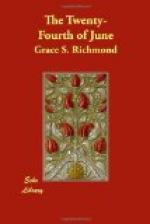Such a starved bank of moss
Till, that May-morn,
Blue ran the flash across:
Violets were born!
Sky—what a scowl of cloud
Till, near and far,
Ray on ray split the shroud:
Splendid, a star!
World—how it walled about
Life with disgrace
Till God’s own smile came out:
That was thy face!
Speeches were forgotten; he devoured the words over and over again. They seemed to him to have been made expressly for him. A starved bank of moss—that was exactly what he had been, only he had not known it, but had fancied himself a garden of rich resource. He knew better now, starved he was, and starved he would remain—unless he could make the violets his own. No doubt but he had found them!
He followed an impulse. Rising, the sheet of yellowed paper in his hand, he walked over to the typewriter. Without apology he laid the sheet upon the pile of typed ones at her side.
“See what I’ve found in an old volume of state speeches.”
Roberta’s busy hand stopped. Her eyes scanned the yellow page upon which the stiff, fine handwriting, clearly that of a man, stood out legibly as print. Business woman she might be, but she could not so far abstract herself as not to be touched by the hint of romance involved in finding such words in such a place.
“How strange!” she owned. “And they’ve been there a long time, by the look of the paper and ink. I never saw the handwriting before. Perhaps Uncle Calvin lent the book to somebody long ago and the ‘somebody’ left this in it.”
“Shall I put it back, or show it to Judge Gray?”
He remained beside her though she had handed back the paper.
“Put it back, don’t you think? If you wrote out such words and left them in a book, you would want them to stay there, not to be looked at curiously by other eyes fifty years after.”
“That’s somebody’s heart there on that sheet of old paper,” said he. Apparently he was looking at the paper; in reality he was stealing a glance past it at her down-bent face.
“Not necessarily. Somebody may merely have been attracted by the music of the lines. Put it back, Mr. Secretary, and concern yourself with Judge Cahill. It’s to be hoped that you won’t find any more distracting verse between his pages.”
“Why not? Oughtn’t one to get all the poetry one can out of life?”
“Not in business hours.”
He laughed in spite of himself at the failure of his effort to make her self-conscious by any reading of such lines in his presence. Clearly she meant to allow no personal relation to arise between them while they were thrown together by Judge Gray’s need of them. She fell to typing again with even more energy than before, if that were possible, while he—it must be confessed that before he laid the verses away between the pages for another fifty years’ sleep he had made note of their identity, that he might look them up again in a seldom opened copy of the English poet on his shelves at home. They belonged to him now!




